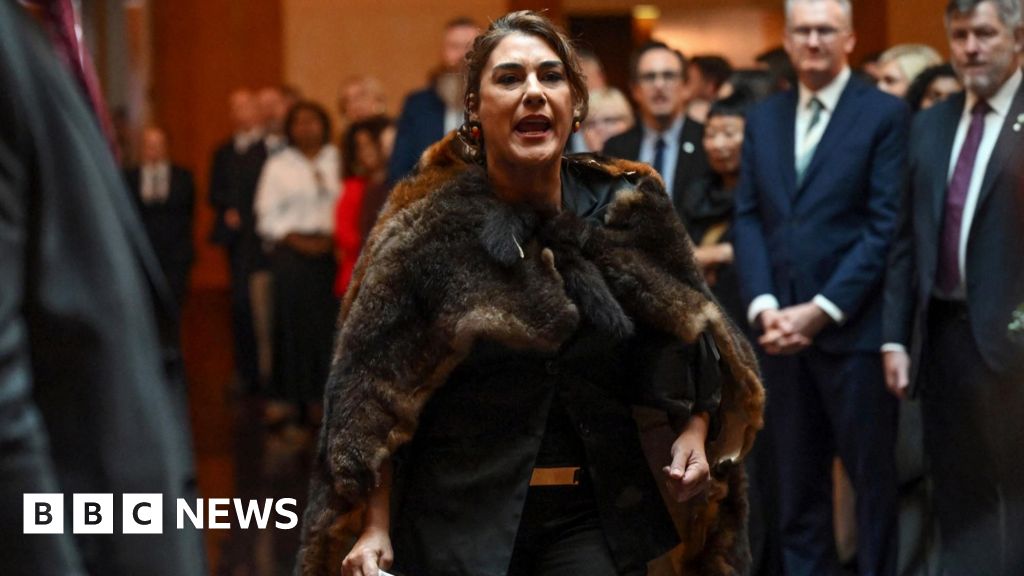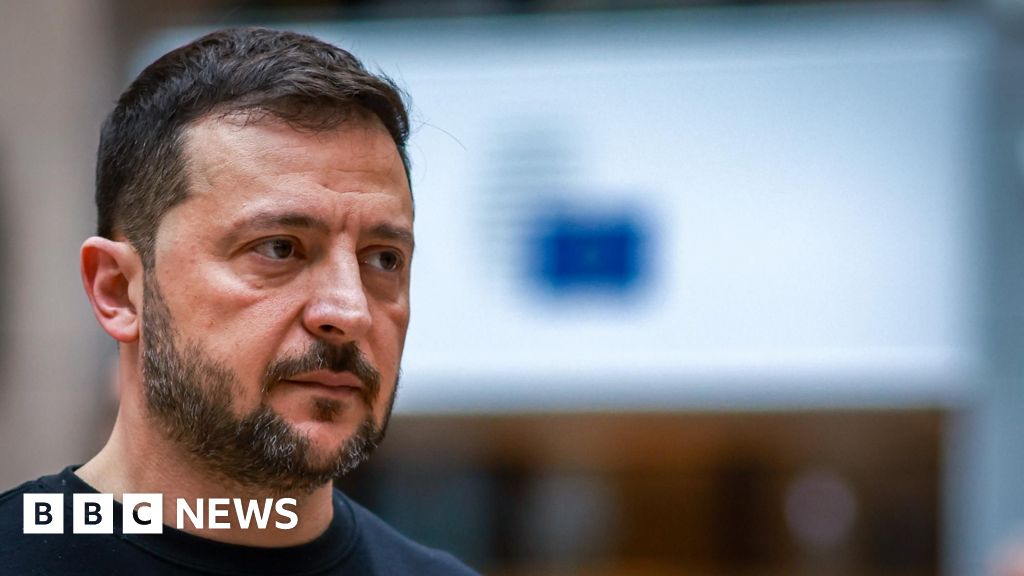ARTICLE AD BOX
Image source, Getty Images
Image caption,Leni Robredo is the main opponent of presidential frontrunner Ferdinand Marcos Jr
In 1986, the Philippine capital Manila was awash with yellow when the People Power movement toppled dictator Ferdinand Marcos.
Now, more than 30 years on, opponents of his son's presidential run are uniting behind one woman for what's been called a "pink revolution" - to stop the return of the Marcos dynasty.
In recent weeks, legions of young voters have voiced their support for Leni Robredo, the current vice-president and the only female candidate in the race to lead the country.
Although Ms Robredo has been polling far behind Ferdinand "Bongbong" Marcos Jr, her pop concert rallies have drawn tens of thousands of people.
At a recent one, a 17-year-old told the BBC he wasn't registered to vote but was there to show his support because "he was helping my mom choose the most qualified and the best president for our country".
"She is the obvious choice," said a 24-year-old woman next to him.
But who is Leni Robredo - and what are her chances of winning?
From yellow to pink
Ms Robredo, 57, a former human rights lawyer and economist, is the main opponent to Mr Marcos Jr, the frontrunner in the 9 May election.
She entered politics after her husband, a former cabinet minister, died in a plane crash in 2012.
In 2013, she successfully ran to become a representative for Camarines Sur in Congress. As a politician, Ms Robredo gained a reputation for being hands-on with voters' problems, visiting low-income areas and remote provinces, speaking directly to the people.
When the country was hit by natural disasters she co-ordinated additional aid and relief efforts. As vice-president, Ms Robredo also took a prominent role in distributing PPE and testing kits during the Covid-19 pandemic. She criticised current President Rodrigo Duterte for lacking decisive leadership during the crisis, at one point asking for blanket authority to tackle Covid-19.
"There's so much that should have been done that's not being attended to, and it's frustrating because we've been asking for these things since last year," she told the Rappler news website in September 2021.
Some have compared her political career to that of former president Corazon Aquino, who rose to power after her senator husband and pro-democracy icon Benigno "Ninoy" Aquino Jr was assassinated. His murder spurred massive protests that ousted Ferdinand Marcos.
Ms Robredo took part in those protests and even used the colour yellow, synonymous with the People Power movement, running as a Liberal Party candidate in her 2016 campaign for vice-president. She beat her opponent, who happened to be Mr Marcos Jr, after trailing him in the polls. He contested the result, bringing about a lengthy court case which was eventually thrown out by the Supreme Court.
Image source, Getty Images
Image caption,Ms Robredo's rallies have drawn massive crowds
But this time Ms Robredo is up against not one but two of the most powerful political families in the Philippines - running alongside Mr Marcos Jr for vice-president is Sara Duterte, the daughter of the current president. Together, they hold sway in both the north and south of the country.
In an attempt to unite the opposition, Ms Robredo is running as an independent, not for the Liberal Party which she still chairs - and which has long been associated with the colour yellow. That may explain her decision to switch to pink when she launched her candidacy last October.
It's become her campaign colour, worn by supporters who include many celebrities and leading figures in the country.
Although she served alongside Mr Duterte, Ms Robredo has an acrimonious history with him. As vice-president, she has been a fierce critic of his brutal war on drugs that has left thousands dead.
Incensed by the criticism, Mr Duterte challenged her to lead the contentious campaign in 2019. She vowed to stop the killing of innocent people and hold officials accountable.
"The president knows what my position is on the drug war. If he thinks that in my accepting this offer I will become silent, he is mistaken," she said.
But she was fired from the job 19 days later - lack of trust was cited as one of the reasons.
In her presidential run, she has promised an honest government and reforms to spur an economy that has been battered by Covid and soaring national debt.
"In my six years as vice-president, I've shown what kind of government I can give Filipinos. A government that focuses on the marginalised. A government that ensures no-one will get left behind. A government that is transparent, where public servants are competent and not corrupt," she said at one her rallies.
Her emphasis on transparency is in sharp contrast to the record of 64-year-old Mr Marcos Jr, who was previously convicted of tax fraud.
He is also yet to pay taxes on the estate he inherited from his father, who stole an estimated $10bn from public funds while in power and whose rule saw thousands of opponents jailed, tortured and killed.
The fight for the Philippines
Those who back Ms Robredo are hoping their "pink revolution" will steer the country back to family values and the rule of law.
But her campaign, fuelled by young volunteers, has had to battle misinformation and a years-long concerted effort to rewrite history.
Social media posts across platforms have sought to present the Marcos presidency as a "golden age", and YouTube and TikTok videos on Mr Marcos Jr have captured the attention of young voters who have no memory of living under martial law imposed by his father.
The platform has also been deployed to discredit Ms Robredo, including sexist and misogynistic remarks and allegations of affairs and a sex tape involving one of her daughters. Ms Robredo denied all the accusations.
Her supporters are not deterred.
"It's been a really tough time to be a Filipino and to feel that the other people are still believing the same things as you and you guys are all fighting for the same things, it's been a lot of fun. Like the rallies, it feels like a big party. It feels like we're waking up and it feels like there's this new sense of hope and pride for our country," 32-year-old Cara Gonzalez told the BBC while campaigning door-to-door for Ms Robredo.
Image source, Getty Images
Image caption,Some two million volunteers are said to be helping run a grassroots campaign for Ms Robredo
Critics of Ms Robredo say she represents the elitist oligarchs of the Philippines. As a former colony of Spain and then America, much of the country's land, agriculture and public utilities remain in the hands of a few ruling families who benefited from close ties to the imperial powers.
The Liberal Party on whose ticket Ms Robredo ran in 2016, has traditionally been connected with the richest and most powerful families in the country. She made the last-minute switch to run as an independent this time when the opposition failed to agree on a candidate.
Some analysts say the need to differentiate herself from the party drove her to choose pink for her campaign. And as the only woman running, they see it as her way of appealing to women. She has said it was her volunteers who chose the colour, which is also a symbol of activism.
The BBC's Howard Johnson in Manila says it was an ambitious choice, given many Filipinos are enamoured by "strongman, machismo" politics, and winning their vote will be essential for victory.
But her supporters say she will help low-income families, farmers and businesses, create new jobs and offer a clear plan to improve healthcare and boost economic growth.
"This time, we don't have to choose who is the 'lesser evil'," 21-year-old Pipay, a social media influencer with 2.5 million followers, told the BBC.
"I think she can do the job, she can be the next leader that we are looking for. We have been searching for so long for a politician who isn't corrupt. This time, it's already handed to us, we just need to look at it."
Reporting by Howard Johnson and Jonathan Head

 2 years ago
24
2 years ago
24








 English (US)
English (US)